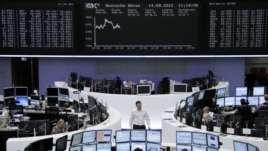European Economy Shrinks
August 14, 2012
PARIS— Europe's
two biggest economies have managed to dodge recession, but newly
published statistics offer grim news for the region as a whole.
New figures released by Eurostat statistical agency show the economies of both the eurozone and the 27-member European Union shrank by 0.2 percent in the second quarter of the year.
The only glimmer of good news came from Germany and France. Growth for Europe's largest economy, Germany, was a modest 0.3 percent. And the second largest economy France managed to escape widespread expectations of recession by registering zero growth for a third consecutive quarter. Recession is defined as two successive quarters of negative growth.
Speaking on French radio, Economy and Finance Minister Pierre Moscovici offered a modestly upbeat reaction to the findings.
Moscovici said there were a few encouraging signs, including a small pickup in investment. But he said the fact that France's economy was faring slightly better than those of Italy and Spain was not good enough. Both economies contracted in the second quarters.
Analysts point to plenty of worrying indicators. French household consumption shrank in the second quarter and unemployment is just below 10 percent.
Economist Nicolas Bouzou, director of the Asteres group, told RTL radio that means the Socialist government in France faces daunting challenges as it tries to both encourage growth and employment and cut the deficit.
Experts are watching France carefully, fearing it may be the next country hit by the eurozone crisis. Some worry the fall may bring more bad news for the 17-nation currency area.
New figures released by Eurostat statistical agency show the economies of both the eurozone and the 27-member European Union shrank by 0.2 percent in the second quarter of the year.
The only glimmer of good news came from Germany and France. Growth for Europe's largest economy, Germany, was a modest 0.3 percent. And the second largest economy France managed to escape widespread expectations of recession by registering zero growth for a third consecutive quarter. Recession is defined as two successive quarters of negative growth.
Speaking on French radio, Economy and Finance Minister Pierre Moscovici offered a modestly upbeat reaction to the findings.
Moscovici said there were a few encouraging signs, including a small pickup in investment. But he said the fact that France's economy was faring slightly better than those of Italy and Spain was not good enough. Both economies contracted in the second quarters.
Analysts point to plenty of worrying indicators. French household consumption shrank in the second quarter and unemployment is just below 10 percent.
Economist Nicolas Bouzou, director of the Asteres group, told RTL radio that means the Socialist government in France faces daunting challenges as it tries to both encourage growth and employment and cut the deficit.
Experts are watching France carefully, fearing it may be the next country hit by the eurozone crisis. Some worry the fall may bring more bad news for the 17-nation currency area.


ไม่มีความคิดเห็น:
แสดงความคิดเห็น